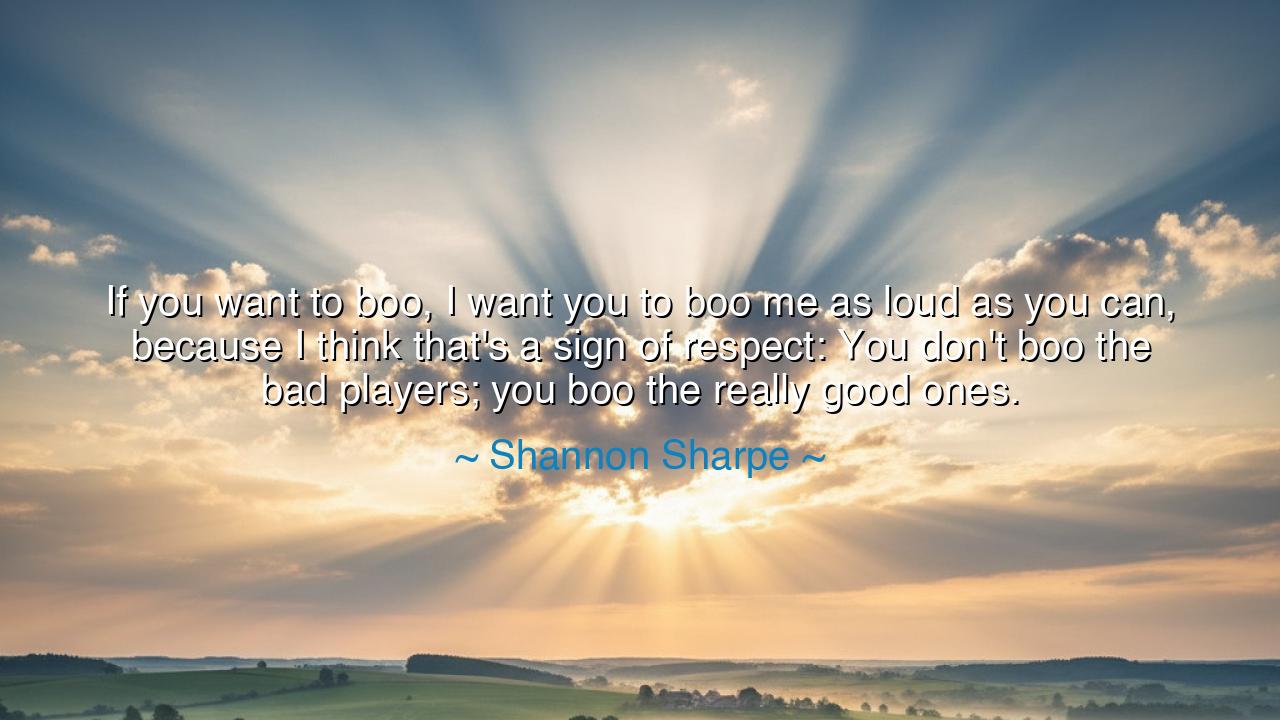
If you want to boo, I want you to boo me as loud as you can
If you want to boo, I want you to boo me as loud as you can, because I think that's a sign of respect: You don't boo the bad players; you boo the really good ones.






“If you want to boo, I want you to boo me as loud as you can, because I think that's a sign of respect: You don't boo the bad players; you boo the really good ones.” Thus spoke Shannon Sharpe, the warrior of the gridiron, a man whose strength was matched only by his wit and fire. His words, though wrapped in humor and bravado, carry the weight of ancient wisdom — the understanding that greatness attracts both reverence and resistance, and that the loudest critics often arise where excellence shines brightest. For those who strive to rise above the ordinary must learn to wear both praise and scorn as the twin garments of mastery.
To be booed, in Sharpe’s philosophy, is not to be dishonored, but to be acknowledged. The crowd jeers not at mediocrity, for mediocrity passes unnoticed; it saves its passion for those who stir its spirit. The boos of the arena are the hymns of rivalry — the sounds of an audience that recognizes a worthy adversary. The Romans, in their grand Colosseums, understood this well. When a gladiator fought with uncommon skill and courage, the crowd roared — some in admiration, others in fury — yet all were united in awe. For even hatred, when directed toward greatness, becomes a strange form of respect.
Shannon Sharpe, forged in the fires of competition, knew this truth through experience. As one of the greatest tight ends in the history of football, he was both celebrated and despised, cheered by his own, jeered by his foes. But he understood the deeper current beneath the noise. When the crowd boos you, it means you have disturbed their comfort, disrupted their pride, commanded their attention. The bad players are ignored; the great ones are remembered — whether in love or in loathing. Thus, Sharpe turns scorn into honor, teaching that the sign of having truly arrived is not universal approval, but unavoidable presence.
The ancients, too, recognized this paradox of greatness. When Socrates walked the streets of Athens, questioning the powerful and exposing the hollow pride of the learned, he was hated by many. His words cut through pretense, and so the city condemned him — not because he was evil, but because he was too true. Yet centuries later, his name endures, while those who mocked him are lost to time. Jealousy and scorn are the shadows that trail every man of light. The booing crowd, in every age, is the chorus of history acknowledging greatness, even when it does not yet understand it.
To receive such opposition, then, is a test of the soul. The weak crumble before it, mistaking disapproval for failure. The strong, like Sharpe, stand tall and smile, knowing that the noise of the crowd is proof of their impact. This is the courage of the competitor, the artist, the visionary: to endure misunderstanding without losing purpose. To be hated is to be seen, and to be seen is to matter. In this, the hero finds peace — not in applause, but in the certainty that his presence cannot be ignored.
Consider also the story of Michael Jordan, whose dominance on the basketball court inspired as much resentment as reverence. Entire arenas booed him, entire teams feared him. Yet he thrived on it, feeding on their noise as fuel for his fire. He once said that the boos “remind me I’m doing something right.” Like Sharpe, he understood that greatness and resentment are bound by fate — that every champion must stand beneath the roar of approval and contempt alike, unmoved, focused only on the work, on the excellence that demands both love and hate.
So, my children, take this teaching to heart: if you are booed, rejoice. It means you have risen high enough to be seen, strong enough to be envied, bold enough to be feared. Let no insult shake your spirit, for only those who dare greatly draw the full attention of the world. Whether they cheer or jeer, let their noise be your music, their disdain your confirmation. Keep your head high, your craft sharp, your purpose unbroken.
For the lesson of Shannon Sharpe’s wisdom is eternal: the world will not always clap for you, but if it cannot ignore you, you have already won. When they boo, smile — for the lion does not fear the roar of the crowd. The louder they cry out against you, the clearer the truth becomes: you have done something worth remembering.






AAdministratorAdministrator
Welcome, honored guests. Please leave a comment, we will respond soon